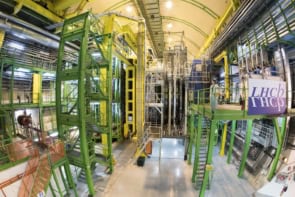
CERN is expected to announce a delay to a major upgrade of the lab’s Large Hadron Collider (LHC) at a meeting at CERN tomorrow. Work began on the SwFr1.5bn (£1.1bn) High Luminosity Large Hadron Collider (HL-LHC) last year, with the revamped machine originally set to switch on in 2026. Physics World understands that a one-year delay is expected to be agreed so that the lab can plug a gap of around £100m that was expected to be contributed to the HL-LHC by non-member countries. The upgraded facility may not now start until 2028.
The HL-LHC upgrade is designed to increase the collider’s luminosity increase by a factor of 10 over the original machine. This requires a significant modification to the beam line around the two largest LHC detectors – ATLAS and CMS. The work will involve upgrading about 1.2 km of the 27 km ring by including 11-12 T superconducting magnets and superconducting “crab” cavities – that reduce the angle at which the bunches cross – to increase the number of collisions at the two detectors. The upgrade also involves modifications to the LHC’s detector so that it can handle the increased luminosity.
Down for longer
Work on the HL-LHC began in 2018 during “long shutdown 2”, which will last until 2021 and will see the completion of most of the civil construction for the new machine. The LHC will then run at 14 TeV for three years before being switched off again for the components of the HL-LHC to be installed during “long shutdown 3”. This was due to begin in 2024 and be complete in mid-2026 after which the HL-LHC would have a month of commissioning before physics begins at the end of that year. CERN begins major upgrade to the Large Hadron Collider
However, Physics World understands that CERN will now have to contribute around £100m more towards the upgrade, which was expected to come from other non-member countries. This move could lead to a delay to the start of long shutdown 3, which is now expected to begin in 2025 and potentially last for three years – rather than 30 months as planned. In this case, long shutdown three would finish at the end of 2027 with physics on the HL-LHC not beginning until early 2028. This potential schedule change was also included in slides by the Columbia University particle physicist Gustaaf Brooijmans at a US high-energy-physics advisory panel meeting in Bethesda, Maryland, last week.
A decision to delay the HL-LHC is expected to be announced following a meeting at CERN tomorrow.
Update 27/11/19: CERN says that no decision has been made on whether to delay the HL-LHC and adds that if any is announced it would not be due to funding reasons. They also deny that there is a funding gap of £100m. Lucio Rossi, head of the HL-LHC upgrade, told Physics World that an international independent review that recently examined the cost and schedule of the HL-LHC found that the dates “were solid” with no need to delay. He adds, however, that it may be necessary to collect more physics data on the LHC as well as extend the detector upgrades. In this case, it may be advised to make the LHC run three one-year longer that would then shift the start of long shutdown three for the HL-LHC to 2025. “There is no delay,” adds Rossi. “Rather an optimization of the physics.”




